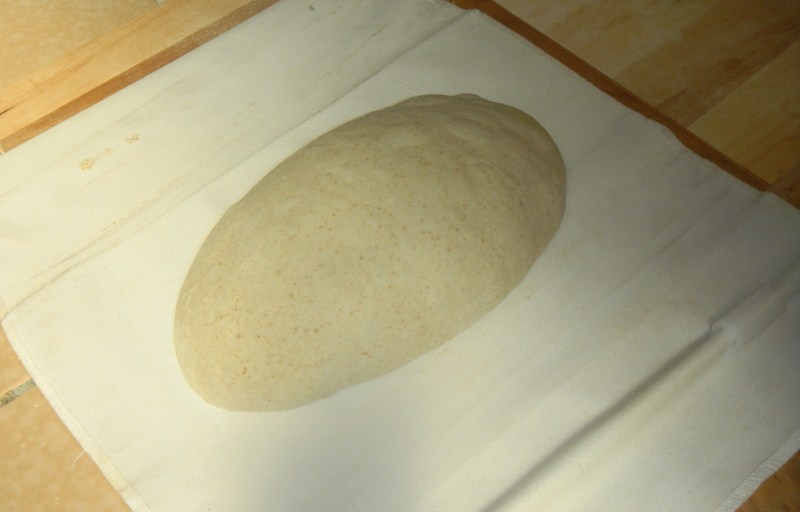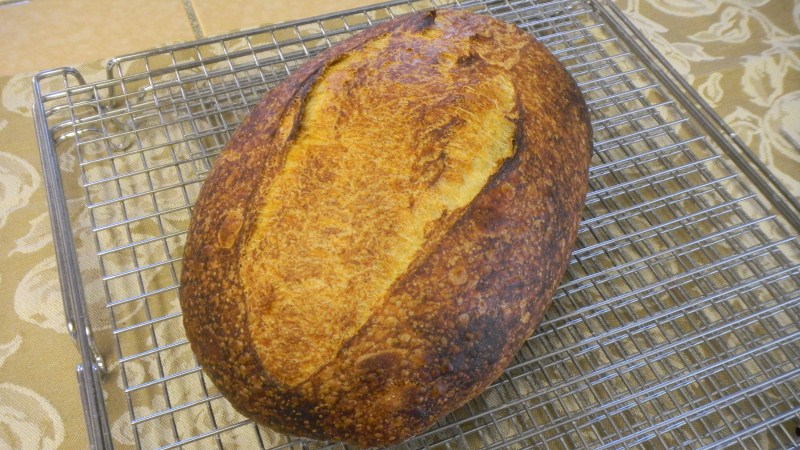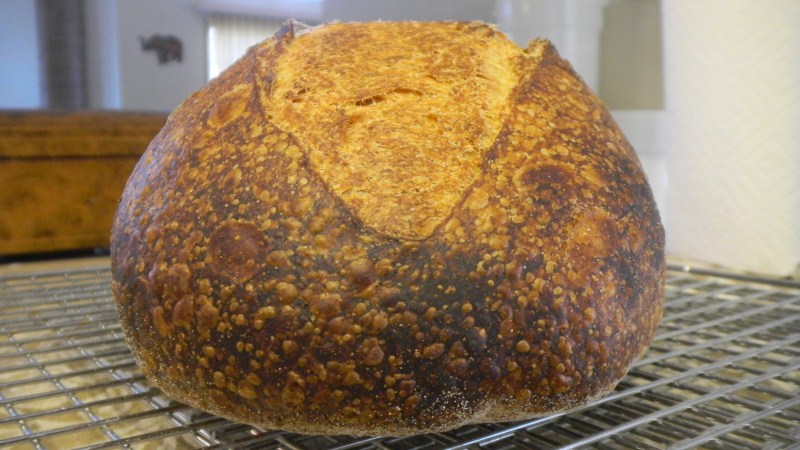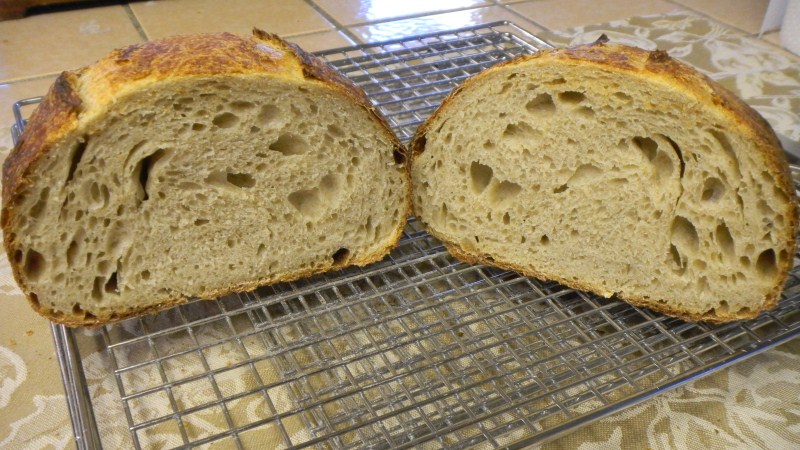Hello,
Here is today's bread, a 10% mash sourdough. The mash was rye+whole-wheat flour, the rest white bread flour. This time I did not use a banneton/brotform. It came out very blistery. Taste is great. :)
Here was the formula/procedure. All weights in grams.
Total Dough Weight: 950
Total Dough Hydration: 68%
Total Dough Flour Weight: 565
Total Dough Water Weight: 385
Levain Percentage: 20%
Levain Hydration: 125%
Starter Percentage: 10% of levain
Starter Hydration: 125%
Soaker Percentage: 54%
Soaker Hydration: 80%
Soaker Salt Percentage: 1%
Mash Percentage: 20% of soaker
Mash Hydration: 200%
Final Dough Salt Percentage: 2.0%
Levain:
Bread Flour Weight: 108
Water Weight: 135
Starter Weight: 11
Mash:
Whole Rye Flour Weight: 31
Whole Wheat Flour Weight: 30
Water Weight: 122
Diatastic Malt Powder: 1
Soaker:
All Mash
Bread Flour Weight: 244
Water Weight: 122
Salt Weight: 3
Final Dough:
All Levain
All Soaker/Mash
Bread Flour: 147
Salt: 8
Procedure:
1. Cooked mash at 66.5C / 152F for 3 hrs, then cooled to room temp.
2. Mixed liquid levain.
3. Mixed soaker by combining mash, more flour + water, salt, and let soak at room temp while levain fermented.
4. Fermented levain at room temp, it was appx 15 hrs to ripen.
5. Mixed everything together, bulk fermented 3.5 hrs, with two stretch and folds.
6. Shaped, final ferment for 45 mins.
7. Baked with steam at 232C / 450F for 40 mins. (First 10 mins w/steam, then vented). Turned mid-way during bake for even cooking.
Pics:
Shaped loaf for final ferment sitting on the super peel:






Happy baking!
Thanks Doc!
For gluten development, maybe I am doing it wrong, but here's what I do with these types of hydration doughs. I have a 5qt viking mixer, the speed settings on the knob go from "stir", then 1-12. Without a mash, it takes 2-3 mins to fully incorporate everything together at "stir". With a mash, it takes 4-5 mins. Once incorporated, I'll usually let it autolyse for 30 mins. Next, I will mix at speed setting 4. It will begin to clear the sides at the high-water-mark level of the dough. As mixing continues, the high-water mark of the dough (which is not clearing the sides) will keep lowering in the bowl. Lowers, lowers, lowers. Meanwhile the mass of developed dough (which has cleared the sides) will start to stretch and slap a bit against the sides. If I continue mixing "all the way", the dough will eventually clear the entire bowl -- both the sides and the bottom. I don't wait for this to occur though, I stop mixing at about 75-80% developed, which means there is a couple inches of dough at the bottom that is not clearing the bowl.
I then pull out the dough and place into a rectangular food-safe plastic box. After the first hour of bulk ferment, the dough will have completely relaxed, almost completely flattened out. My first 'stretch + fold' is more like 6-8 stretch+folds, like folding up an envelope a couple of times on itself. The dough is initially very extensible but it becomes more elastic with the folding. It will relax again after a couple more hrs of bulk ferment (though not as much as before), but the 2nd stretch+fold brings more strength. The final strength comes from the shaping. Seems to work OK for me.
My oven is an older style GE non-convection oven.
Thanks again!
Lovely! I'am glad you've found a formula of mash bread that you like. Beautiful results, gvz!
Love blisters on crust, too! The crumb also look nice and open.
Thank you for sharing. :)
lumos
Thanks!
I am always very impressed with your breads also, Mebake and lumos.
For me, this may sound cliche, but bread-making is very much about the journey, not the destination. I do file away some of my better ones and will sometimes repeat, but there's so much to learn and to try, from books, this forum, and plain ole trying stuff out! Life's too short to make the same bread over and over. :) (I would be a horrible bakery baker, my customers would get something different every day. :)) Bread-making is also a great counterbalance to other aspects of life.
gvz,
I hope you're not going all Zen/Hippie on us (carry water, chop wood). {:-))
Jim
Though I do agree bread-making is much about the journey, I sometimes wish I'd arrived the destination already. :p